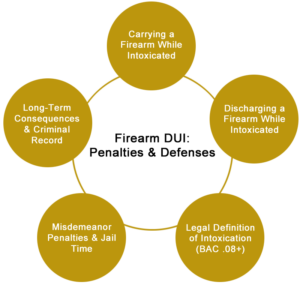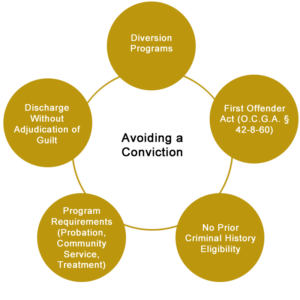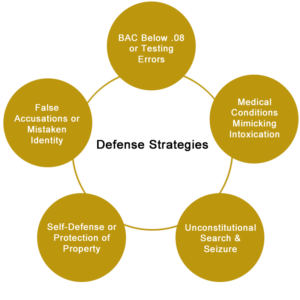 DUI laws are not simply for vehicles in the state of Georgia. Under two key statutes of the law, it is illegal to be under the influence of alcohol or drugs while carrying or discharging a firearm.
DUI laws are not simply for vehicles in the state of Georgia. Under two key statutes of the law, it is illegal to be under the influence of alcohol or drugs while carrying or discharging a firearm.
The law governing carrying a firearm under the influence can be found in O.C.G.A. § 16-11-132, making it illegal for anyone to carry a firearm if they are intoxicated. In the legal sense, intoxication means demonstrating a blood alcohol content (BAC) of .08 or higher, or being found with any amount of controlled substance including marijuana in the urine or bloodstream.
Examples of carrying a firearm under the influence would include a person leaving a bar after an evening of heavy drinking with their handgun holstered on their person. It doesn’t even necessarily need to be that they’ve been drinking – even carrying a gun after smoking marijuana on your own private property is illegal. And the weapon doesn’t need to be carried in a holster. Possessing a gun in a purse, backpack, or in a car while intoxicated will still lead to charges.
A charge of Carrying a Firearm While Intoxicated is considered a misdemeanor, with a jail sentence up to 12 months and/or fines up to $1,000 as well as potential community service and mandatory firearm safety courses or substance abuse counseling. A judge will often grant probation, with certain conditions that must be met to avoid jail time, but a conviction will still remain a part of a permanent criminal record with long-term effects on employment and firearm rights.
The law governing discharging a firearm under the influence can be found in O.C.G.A. § 16-11-134. This statute carries the same legal definition of intoxication – a BAC of .08 or higher or any controlled substances present in the urine or bloodstream – criminalizing the firing of a firearm while doing so.
It doesn’t matter what the situation is – target practice on private property, or even firing a gun to ward off an intruder – if the person in question has been drinking excessively or using drugs, they could face charges. In the case of the intruder example, there is a defense for firing in defense of life, health or property, but it is extremely narrow in scope.
This charge is considered a misdemeanor of a high and aggravated nature, carrying more severe penalties including up to 12 months in jail and/or fines up to $5,000. On top of that, a judge may order between 40 and 240 hours of community service, payment of restitution if any injury or damage occurred, or mandatory attendance at anger management, rehabilitation or firearm safety courses. A judge may still grant probation for these elevated charges, with greater penalties for violating probation, and a conviction will remain on a criminal record permanently.
 What are Alternatives to Conviction?
What are Alternatives to Conviction?
Under Georgia law, diversion and first-offender programs exist that provide eligible defendants a chance to avoid a permanent conviction on their record, particularly those who have no prior criminal history.
Diversion programs are generally offered at the county level, outlining a specific set of requirements that a defendant must meet in order to see charges dismissed so no conviction appears on their record. These requirements could include probation, community service or completion of treatment or educational programs.
In fact, Georgia law carries a specific statute, found in O.C.G.A. § 42-8-60, known as the First Offender Act that protects those being convicted for the first time. Under this law, a defendant can plead guilty but see their case discharged “without adjudication of guilt” upon successful completion of court requirements. Satisfy the court’s requirements, and defendants will not have a conviction on their permanent record. Fail to do so, and the court can impose the original penalties including jail time.
 Potential Defenses Against Charges
Potential Defenses Against Charges
For each of the two charges we’ve discussed – Carrying a Firearm While Under the Influence and Discharging a Firearm While Under the Influence – there are several different defenses that an attorney could employ in defending their client.
Looking at the example of the man leaving the bar with a holstered gun, further testing could show that his BAC was actually below .08 percent, or that there were issues with the testing where law enforcement didn’t follow proper procedure. It could even be shown that a medical condition such as diabetes may have caused the perception that he was intoxicated. In cases where the charges stem from a traffic stop, it could be shown that the officer didn’t follow the legal guidelines dictating a search, rendering the stop unconstitutional, or that the firearm wasn’t actually the property of the defendant
In cases where there is a discharge, there are several defenses that could be employed to see charges dismissed or reduced. As mentioned in the earlier example where a homeowner fires a weapon to scare off an intruder, it could be argued that they were protecting their own life or property. The same issues with testing could apply, allowing attorneys to show their client wasn’t actually intoxicated. It could be demonstrated that the defendant was falsely accused, or didn’t actually discharge their firearm. And as always, constitutional protections against illegal search and seizure could be invoked as a defense.
How We Can Help
We at The Turner Firm take every case seriously, pursuing justice for our clients through relentless preparation. Starting with the very first free confidential case evaluation, we begin scouring every piece of evidence, challenging every assumption, and asking the right questions. We determine whether or not our client was truly carrying the weapon in the legal sense, whether law enforcement erred during the initial arrest, or failed to properly administer needed tests. No matter how small the piece of evidence the prosecution carries against you, we work tirelessly to undermine it and find its weaknesses.
It’s a tireless pursuit of impeccable preparation we bring to bear for each client, resulting in dismissals and reductions in charges. If you’ve been accused of carrying or discharging a firearm while intoxicated, call us today to schedule your free no-obligation consultation. We’ll listen to you, find the real facts, and explain your options. Then we’ll move forward together with confidence that we will protect your rights.
